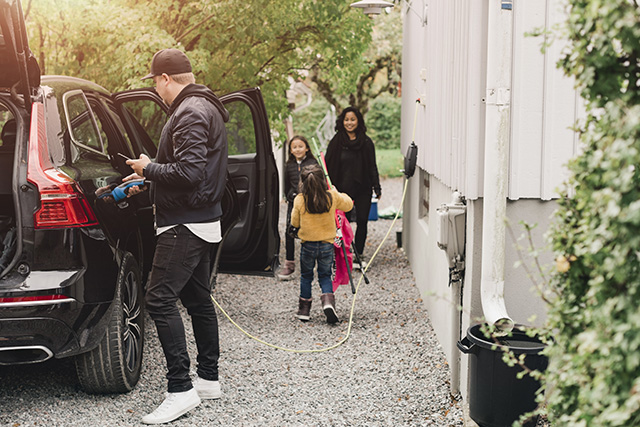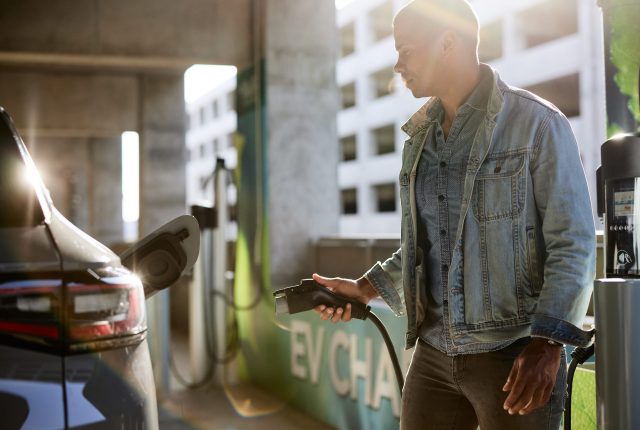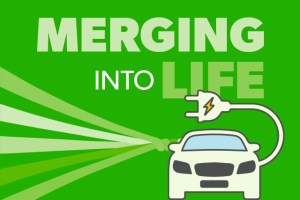Every year, electric vehicles become more prevalent on our roadways. EVs seem to be everywhere and charging stations are popping up at malls, rest stops and office buildings. Last year, 16% of total U.S. car sales were electric or hybrid vehicles. This increase in sales is due in part to the clean vehicle tax credit available through the IRS and from state-sponsored rebates at participating car dealerships. These tax credits and rebates offer consumers a direct financial incentive for purchasing an environmentally friendly vehicle.
The following is an overview of the EV rebates available in AAA Northeast’s territory for 2024. Each state has a different rebate program ranging from $750 to more than $4,000 for a qualifying purchase or lease.
Connecticut
Connecticut has a robust electric and hybrid vehicle rebate program run through the Department of Energy and Environmental Protection that offers rebates on the purchase or lease of new vehicles. The program, CHEAPR (the Connecticut Hydrogen and Electric Automobile Purchase Rebate), also offers an additional rebate for income qualifying individuals on both new and used vehicles. To advance EV usage across the state, the state also created a program supporting the installation of EV charging infrastructure. Finally, some small, local businesses provide Connecticut residents with additional incentives for transitioning to electric or hybrid vehicles.
Connecticut’s Rebate Offers
- $4,250 rebate for purchase or lease of electric vehicles.
- $2,250 rebate for purchase or lease of plug-in hybrid vehicles.
- Additional rebates for income qualifying individuals including on used vehicles.
Massachusetts
Massachusetts has a program called MOR-EV, Massachusetts Offers Rebates for Electric Vehicles, which allows residents, businesses and non-profit organizations to apply for a rebate on the purchase or lease of electric or hybrid vehicles at the time of the transaction. Like its neighbor to the south, Massachusetts also offers an additional rebate for income qualifying individuals. EV buyers can also turn to their utility companies for incentives, as several local utilities offer rebates and savings for in-home upgrades made for EV charging units.
Massachusetts’ Rebate Offers
New Electric Vehicles
- $3,500 rebate, at participating dealerships, for purchase or lease. EV drivers can also apply online for the rebate within 90 days of lease or purchase of the new vehicle.
Used Vehicles
- $3,500 rebate for qualifying individuals.
Additional Rebates
- Additional $1,500 for income qualifying individuals.
- Additional $1,000 for trading in a qualifying vehicle.
New Jersey
New Jersey’s program, Charge UP New Jersey, is available to consumers buying or leasing a new car at a participating dealership. The Garden State also offers a rebate for installation of an EV home charging unit.
New Jersey’s Rebate Offers
- Up to $4,000 rebate for purchase or lease of new electric vehicles.
- $250 rebate for Level 2 home charging unit.

New York
New York runs its EV rebate program, Charge NY, through the New York State Energy Research and Development Authority. The program offers NY residents or businesses a rebate on the purchase or lease of new electric vehicles. The State’s Charge Ready NY 2.0 program also offers incentives to businesses to install publicly located Level 2 EV charging stations.
New York’s Rebate Offers
- Up to $2,000 rebate for purchase or lease of a new electric vehicle.
- Up to $1,000 rebate for purchase or lease of new plug-in hybrid vehicles.
Rhode Island
DRIVE EV, Rhode Island’s electric vehicle rebate program, offers rebates for the purchase or lease of new and used electric and hybrid vehicles. Rhode Island also offers an additional rebate for income qualifying residents and for small businesses looking to update their fleet.
Rhode Island’s Rebate Offers:
New Vehicle
- $1,500 rebate, at participating dealerships, for purchase or lease of electric vehicles.
- $1,000 rebate, at participating dealerships, for purchase or lease of plug-in hybrid vehicles.
Used Vehicle
- $1,000 rebate for used electric vehicles.
- $750 rebated for used plug-in hybrid vehicles.
- Applications for rebates must be submitted within 120 days of purchase or lease.
Federal Tax Credits
Across the country, EV buyers are also eligible for federal tax credits for plug-in electric and fuel cell electric cars, including:
- Up to $7,500 income tax credit, which must be applied for and approved at time of new vehicle purchase.
- Up to $4,000 federal tax credit for pre-owned electric, plug-in hybrid and fuel cell electric vehicles.
- Rebate of 30% of the cost, up to $1,000, for a home electric vehicle charger.
Did EV rebates and incentives play a role in your decision to purchase an electric vehicle? Tell us in the comments.
11 Thoughts on “EV Rebates 101: 2024 Edition”
Leave A Comment
Comments are subject to moderation and may or may not be published at the editor’s discretion. Only comments that are relevant to the article and add value to the Your AAA community will be considered. Comments may be edited for clarity and length.
















I just purchased a used absolutely beautiful Model 3. I got both the Federal and State rebates, which can now be used as a down payment. I could never have done it without it. I’m so happy that President Biden kept this program going and also included used cars.
I am definitely poised to embrace my first EV vehicle, until, that is, I remember, Oh wait, like probably 2/3rds of all New York City residence, I live in an APARTMENT! How do I charge my spanking new EV each night, when I, you know….LIVE IN AN APARTMENT?! Until they can resolve that rather insurmountable road block, no way a good swath of city folks will even consider investing in an EV.
The statistic of 16% of vehicles being purchased are EV or plug-in hybrid is not useful without individual statistics for each type.
The early adopters of EV’s have made their purchases. EV’s lose 50% of their value when driven out of the dealership. Significantly more than ICE or hybrid vehicles. This means resale on the used market is very low.
The charging infrastructure is woefully inadequate. I would never undertake a long trip in an EV. The stories of being stuck for long periods of time waiting to charge are common. If I had a daily commute of under 150 miles round trip, I might opt for a small, cheap EV. But never for a primary vehicle.
Milford CT passed an ordinance prohibiting charging stations in underground parking structures. The Connecticut General Assembly has raised a bill, SB 343, that proposes to “prohibit parking electric vehicles in parking garages.” This applies to residential and commercial garages.
This is all because EV fires are difficult or impossible to extinguish. The recommended procedure is to let the fire burn out. If that is not possible, then the only method is lots and lots of water. One EV fire in Stamford, CT took 12,000 gallons of water to extinguish. That’s the equivalent of 10 FD tanker trucks. It can’t be smothered because LiON batteries generate their own oxygen while burning.
My biggest complaint is states prohibiting sales of ICE vehicles. California has set a date. Others will likely follow. The election in November will determine which direction bans of ICE vehicles goes.
And my biggest complaint about your ice vehicle is your refusal to accept the cost of the externalities: melted ice caps, bleached coral reefs, methane release from melted permafrost. You know exactly how much damage fossil fuels are causing, and just how irreversible that damage is. In a few years much of the planet will be uninhabitable. It’s called climate SCIENCE for a reason. Sorry if you find it inconvenient. It’s our heedless lack of concern for the environment that created this situation. There’s only a year or two left to make the transition. After that you need to know how to tread water.
Remember the bridge on I 95 in Connecticut that was destroyed in a fuel tanker fire? Maybe internal combustion vehicles should be banned from highways to keep us all safe. Same reasoning.
Why does AAA push EV’s so much?
I believe in electric cars. However, our government and others are trying to incentivize EV’s with rebates since the buyer understands the limitations of EV’s at this point in time and they are not buying EV’s, hence the need to discounts the vehicles. The infrastructure to support the use of EV’s needs to be stengthened, but the need to implement green energy has been given a higher prority.
The electric grid is insufficent to support EV’s. I might add that the rise in AI will be added strain on the grid. There is little investment in increasing the grid capacity.
EV’s batteries are much improved, but are still inadequate, The batteries lose power when the temperatures are cold like winters in New England. It should be noted, Solar and wind are on demand and there is little if any capacity to store excess power for when the wind doesn’t blow and the sun doesn’t shine.
Battery fires and damage are a concern. You can compare a lithum battery fire to a large tire fire. WIth a battery fire, based on the tech bulletin from Tesla, the fire department is suggested to drown the car and batteries for 48 hours. Tire fires the burning tires are spread from the other tires and allowed to burn out. It is all about BTU’s.
When you leave the two coasts the distances increase dramatically and there are a limited number of charging stations. The government budgeted $7.5 billion 2.5 years ago and have built only 8 charging stations.
Charging tine is based the electric input. With a 440 volt 3 phase system it would be quick. In our homes we have 220 volts and we need to have a charging system installed at a cost of over $2,000, probably more.
The cost of electricity has increase over 30%. The KWH cost in articles including were quoted at 10-12 cents. That cost does not include distribution and other charges. The CEO of Ford took a F150 Lightning from Detroit to a car show in Chicago and the CEO had difficulty finding charging stations that work and finally transferred to a gas vehicle.
The question becomes if the consumer did fall in love with EV’s how will that affect the other demands on electricity and the growth of AI?
I’ve been driving a Ford Lightning for a year and a half now. Fast, quiet, smooth and I’m not melting the icecaps with my tailpipe co2. Make the gasoline from my paid off solar array, I.e., it’t free. Charging takes planning, but it’s workable. How often do you really travel more than 300 miles? Only immediate, drastic action will save whatever is left of nature. Sorry if you’re inconvenienced.
So what’s your solution for the heat, the flooding, the agricultural failures, the biodiversity loss, and the sea level rise that’s already here and will increase every year until we stop burning fossil fuels? Your objections, mostly inaccurate, pale in comparison with that impending horror.
I agree 100% with M’s comments.
I am definitely not interested in an electric vehicle. I have heard so many nightmares about them. Not enough charging stations and the charging stations are hard to find and the take a long time to charge. They catch on fire. And I am afraid the battery would die out why driving that’s a real issue for most people that have anxiety issues.You can’t drive long distances distance. They are to expensive. Everyone I talk to has no desire for an Electric vehicle and people shouldn’t be forced to get one. The government needs to stop pushing Electric cars the people of America should have a say
So where is your anxiety about your continued participation in heating the world past its tipping points and irreversibly destroying nature. That carbon dioxide coming from your tailpipe is deadly. Sorry if you feel inconvenienced by making the switch to Evs. You have no moral choice.